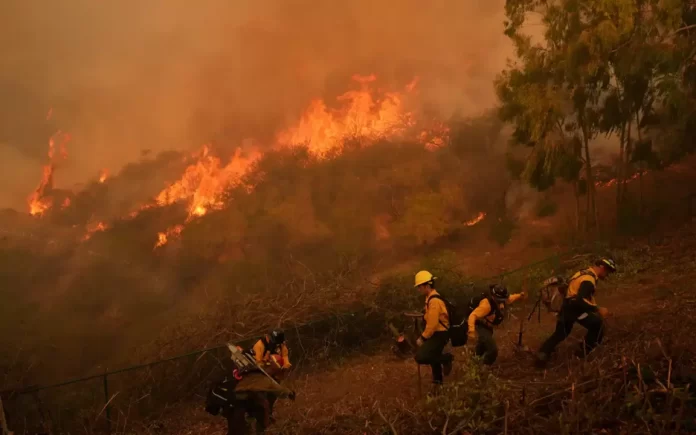On Jan. 7, 2025, the Palisades, Eaton, and Hurst fires began to spread throughout California. At the time of publication, the death toll is at 28 and there are more than 16,000 constructions wrecked. The wildfires continue to be an active threat as the Santa Ana winds are spreading through the south of California at alarming speeds.
Dr. Mariano Mapili, UFV associate professor of Physical Geography within Planning, Geography, and Environmental Studies, explained the necessary temperature, humidity, and wind conditions that create a forest fire.
Mapili said that experts use the “30-30-30 rule” to determine the danger level of the fire. If temperatures are in the range of 30-31.5 degrees, the humidity is under 30 per cent, and the winds are 30 km/hr, then there is cause for alarm.
Mapili, who has been teaching at UFV for 17 years, shared that as people build their houses closer to the forest, the Forest Service will attend more calls on small fires. However, he said this will create more fuel and increase the risk of a bigger fire.
“If you keep on dousing those fires, the fuel will accumulate, and then it’s a big one. It’s better to have very small ones. Let them burn because it’s natural. That’s the way the forest will renew itself.”
Mapili honoured the wisdom and knowledge of Indigenous people, who skillfully handled these issues in the past.
“[They] were the ones who are the fire experts, and that’s why now we still go back to them and say, ‘What did you do before?’ because they managed forest fires before.”
He gave an example of how Indigenous people managed fires with the practice of controlled burning and how that’s been lost in favour of modern technologies that are often more harmful.
“They followed bison and created fire so that there would be grass when the bison came.”
When it comes to the LA fires, it’s already past the point of not dousing them, and despite the reluctance to use salt water to fight the flames, Mapili believes it’s necessary to combat the urgent situation.
“Yes, there will be salts, but sooner or later, there will be rain again … So, it will be washed. You have to look at which is the lesser evil. They want to prevent other houses from being burned.”
Mapili firmly believes that people can expect a big flood in LA once the fires have been controlled, which seems to be the overall consensus.
He commented on the multiple methods of prevention that could be done, especially firebreaks, as they act as barriers that stop fire from spreading — but they aren’t being put into practice as they should.
“I used to teach Natural Hazards … we taught that there should be a firebreak around communities so that if there’s a big forest fire, the community will be protected. But look, how many have breaks? None; they only put the break when the fire is coming.”
Mapili also mentioned how diversifying the species of trees they plant also helps prevent fires.
“We always say it is better to have to plant trees that are different in species, different in size so that they are more resilient.”
He pointed out that trees susceptible to burning are easy to identify, and they should be cut down before they inevitably burn. This way, there would be profit for logging companies, and they would be able to replant in a way that prevents the whole forest from burning down.
When asked about the Canadian government’s knowledge on this issue, Mapili referred to a 2003 investigation into the Kelowna fires and how, two decades later, the same story repeated itself.
“I think the former Premier of Manitoba was the lead author of the investigation, and that was 2003. [In] 2024, 20 years later, another fire popped up in the same place. So, we visited Kelowna in 2024 to present some papers, and one of the field trips was to look at these forest fires. I said, ‘Didn’t we learn? 20 years later, we are in the same place, the same fire.’”
He suggests that while they are aware of these reports, there are political realities they need to consider as well.
“I don’t know if we will ever have a premiere who will wake up these people saying, ‘This is the right thing to do, you should do this.’ But again, the solution is there.”
All this information lies in the hands of the government, but the question remains on whether people will listen and take action.


